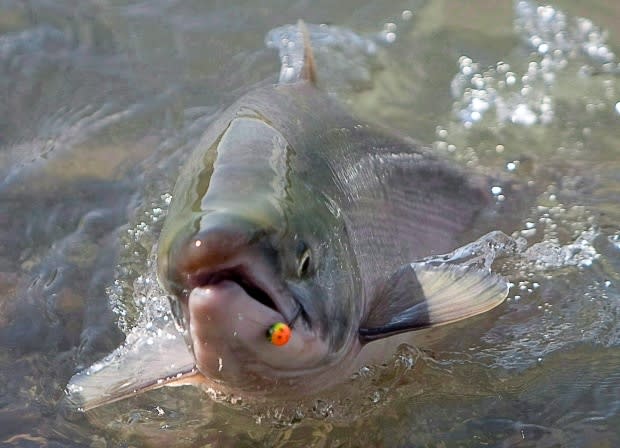First Nations, fishing guide push for jet-boat ban on Pitt River to protect salmon

Fishing guide Dan Gerak says this has been the worst year he's ever seen for jet boats damaging salmon spawning grounds by tearing through shallow sections of the Pitt River.
Gerak, whose lodge is located between the northern tip of Pitt Lake and Garibaldi Provincial Park, says there have been days when he has seen dozens of boats speeding through the Pitt River and its tributaries, sometimes in water that is only centimetres deep.
"You wouldn't run a dirt bike through a chicken coop," he said.
"But here they are, going over fish and eggs under the gravel, killing the salmon."
Jet boats are propelled forward when water is sucked into the craft and then shot out the back, which allows them to operate in much shallower areas than propeller boats.
Gerak says the jet stream sprays smolts and eggs with great force and the boats' Teflon bottoms allow them to travel over gravel without causing damage.
"The weight of the boat pushing down in the water through the gravel kills the eggs under the hull of the boat," he said.
"Jet boats are killing the fish, so they need to shut this river down to jet boats."
The Lower Fraser Fisheries Alliance, which represents First Nations along the Fraser River, is joining Gerak's call to impose restrictions on jet boats.
Katzie First Nation Councillor Rick Bailey says the LFFA is preparing an application to Transport Canada to have the boats restricted or banned altogether from the upper Pitt River.
"I'll take whatever we can get, whether it's a speed restriction or a zone restriction," he said.
"If it's a total ban, that would be a dream come true."
Watch: Dan Gerak talk about the jet boats he's seen on the Upper Pitt River.
Jet boat joyriders
Fisheries and Oceans Canada detachment commander Art Demsky says he's heard about people in the area but officers conducting helicopter patrols have only spotted one or two jet boats at a time this year, and they've been fishing.
He believes it's a small group of the same people that go out joyriding.
"Some people are saying, 'Well, it's jet boats that are causing a lot of disturbance and killing fish and eggs,'" he said.
"I have not seen anything that supports that."
Gerak says he has seen a steady increase in jet boats since the weather warmed up last month and the days surrounding B.C. Day were incredibly busy.
"There were probably 30 boats in the river," he said.
"They were zipping up and down all over, going up spawning channels and little side channels."

Time for restrictions?
Demsky says officers also perform dock and roadside checks but there currently aren't any motorboat restrictions to enforce.
He says he's had several conversations with the Katzie First Nation about the issue and hopes a solution can be reached through talks with fishermen who use jet boats, guides, First Nations and other stakeholders.
"If someone were to get restrictions, I wouldn't be against it personally," he said.
"I don't think our officers would either."
The provincial government has put up signs in the area urging boaters to use caution, but it's up to Transport Canada to implement bans or restrictions.
In a statement, the government agency says regulations are a last resort for solving problems.
"Involved stakeholders working together can often find more timely, effective and affordable solutions," Transport Canada said.
"When parties cannot agree on an alternate solution, the regulations can be an efficient way to resolve the conflict related to the use of the waterway."

Saving salmon
Murray Ned, executive director of the LFFA, says the 2019 salmon run was dismal and early projections suggest this year may be even worse.
Ned says drastic action is needed to save B.C.'s salmon and it's important for jet boaters, ATVers and others to be included in the discussion.
"Let's find a way to work together because one nation or one tribe cannot make a difference," he said.
"If these recreational groups want to have dialogue over some proposed First Nation thoughts, I think there's a place and a venue to set the table for those suggestions."
CBC Vancouver's Impact Team investigates and reports on stories that impact people in their local community and strives to hold individuals, institutions and organizations to account. If you have a story for us, email impact@cbc.ca.


